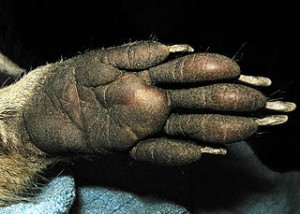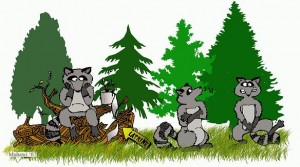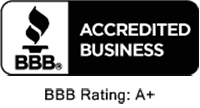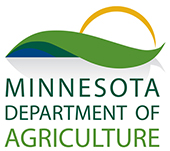MN Wild Animal Removal, Prevention & Animal Damage Repair
The Raccoon is a most unusual critter. The word “raccoon” is derived from the Algonquian word aroughcoune, “he who scratches with his hands.”
Raccoons will eat anything! Raccoons are the scavengers of the animal kingdom. Raccoons love to find good food in the garbage. That head you lopped off a fish, the cold pizza you decide to throw out, and even the half-finished bottle of wine or Coke you toss into the rubbish bin is a raccoon’s late night treat.
If you hear mouse-like squeals from above your fireplace damper, chances are they’re coming from baby raccoons. March through June is usually baby time.
Raccoons are one of the few animals that have benefited from human characteristics. They have thumbs that make quick work of garbage cans, doors, and other formerly closed, containers. The single most important thing anyone can do to keep raccoons off the property is to make sure that trash cans are securely shut at night.
They are also one of the few animals that can descend a tree head first. Amazingly, they rotate their hind feet 180 degrees to accomplish this feat.
Rabies in Raccoons
Raccoons are known to carry a number of diseases and internal parasites. The raccoon roundworm, an infection spread to people by the accidental ingestion or inhalation of roundworm eggs from raccoon feces, has caused increased concern in recent years. Roundworm infection can cause serious disabilities, and young children are thought to be most susceptible.
WHAT YOU NEED TO KNOW ABOUT RACCOON ROUNDWORMS
For more information:
Visit the Centers for Disease Control and Prevention website: Raccoon Roundworm Infection (Baylisascariasis, Baylisascaris Infection)
Raccoons are also carriers of rabies. Raccoons act as a reservoir for rabies in the United States. Raccoon rabies was much less prevalent in the U.S. prior to 1950. But during the next 20 years, raccoon rabies began to spread and reports increased.
In fact, the majority of rabies cases in the U.S. are in wildlife, with raccoon cases predominating. In the U.S., 90% of all rabies cases occur in wildlife. During 2000, raccoon rabies made up 41% of wildlife cases diagnosed with skunks, bats and foxes making up the balance.
According to a 2003 Purdue University newsletter: “There has been an increased number of rabies cases in domestic animals in the northeast due to raccoon rabies. Therefore, rabid raccoons could potentially lead to human exposure through rabid domestic animals.
“In 2003, the Centers for Disease Control & Prevention confirmed the first human death associated with Raccoon Rabies.
Prevent Wild Animal Problems
Preventing wild animal problems is more effective, less expensive and friendlier than waiting for a bump in the night. No matter how cute or in need of help an animal appears, maintain your distance.
The best prevention advice is to stay away from wild animals, live or dead, and call a Wild Animal Control Expert immediately. If your pet is acting ill or strange, contact your veterinarian immediately!





